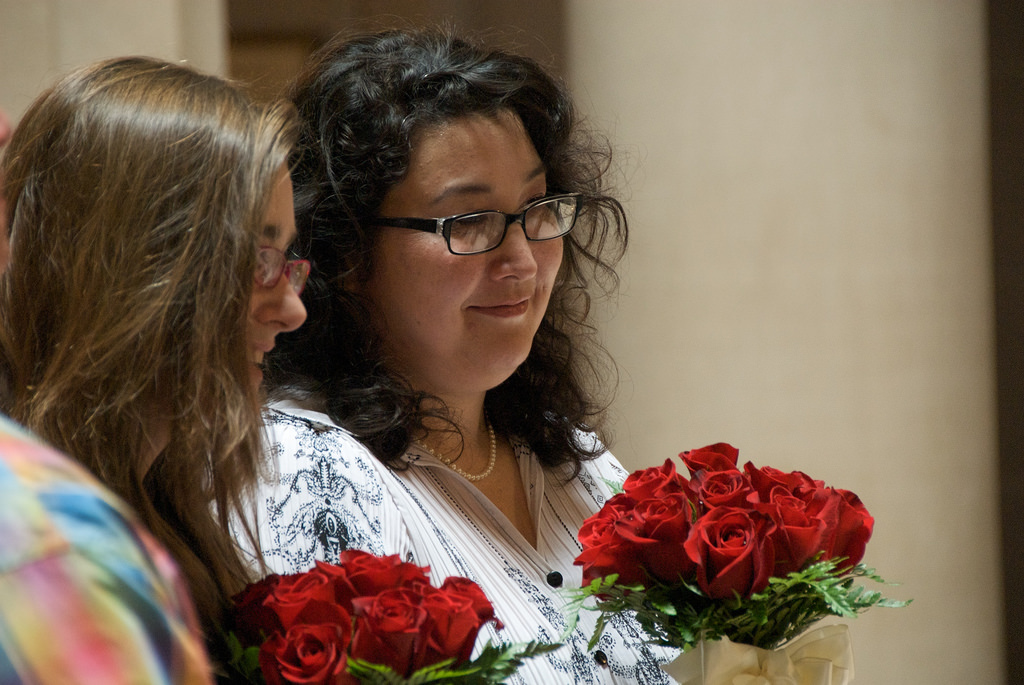30 years ago, a group of four lesbians slipped into the BBC studios and started yelling on the flagship Six O’Clock News. One presenter tried to keep going, while the other sat on one of the protesters. Two of the women handcuffed themselves to things in the studio.
After a few minutes of chaos, they were removed from the broadcast.
Lesbians also abseiled into the House of Lords and they, like the BBC News invaders, were protesting against the introduction of a new law, Section 28 of the Local Government Act. This made it illegal for local councils to “promote homosexuality as a pretend family relationship” and this included banning the promotion of homosexuality in schools.
This took place under Margaret Thatcher’s government, at a time when a whopping 75% of the UK population thought that same-sex relationships were “always or sometimes wrong”. Lesbian, gay and bisexual people were very much an oppressed minority and Section 28, the shorthand the law became known as, could only do damage.
Gay youth groups had their funding cut, health promotion efforts took a financial hit, libraries removed relevant materials and schools were so afraid of breaking the law that they avoided even tackling homophobic bullying. Teachers did not dare address issues of same-sex relationships with their pupils, and the areas where slow progress had already been made began to struggle.
Section 28 was a disaster. Thatcher had managed to introduce the first homophobic law for more than a century, having told her Party Conference in 1987 that “”Children who need to be taught to respect traditional moral values are being taught that they have an inalienable right to be gay.
“All of those children are being cheated of a sound start in life. Yes, cheated.”
As one of those children – aged 11 when the law came in in 1988 – I wish I had been taught that I had an inalienable right to be gay, for I did. Instead, I was in the closet until my adulthood and found the whole process incredibly painful. Section 28, even though I had never heard of it, could have prevented someone in my adolescence from telling me that who I was, deep down inside, was ok. Not a cheat. Not a pretend relationship. Ok.
The law was partly in response to Conservative people and conservative people freaking out about a picture book for children about a girl with two dads. One picture book, in the midst of a billion others, was the grounds to declare children potentially damaged and to bring in massive legislation that had far more of an impact than its proponents could have imagined.
By the time I came out in the mid 90s, Section 28 was still law and we were campaigning against it along with campaigning for an equal age of consent for gay men and equal employment rights for all. It took until 2003 for the vile law to be overturned, by which time many people had already gone through appalling experiences because their teachers, librarians, youth workers and health workers could not tell them they were not fundamentally flawed. And that shit is destructive to a person’s very soul.
A trans section 28
I have seen calls amongst transphobes for a “trans Section 28”. Others wring their hands about picture books in schools with gender neutral or transgender characters, and panic when girls are allowed to be girls and boys allowed to be boys in their classroom; the space they spend 30 hours a week in. When those girls and boys have slightly different bodies to their schoolroom friends of the same sex, some schools say that is ok – and that is precisely what they should be doing. But that does not happen without protest.
The transphobes panic, they say that their taxes should not pay for such propaganda, and they object to public bodies producing literature, sharing resources or offering support to children and families who find themselves in tricky situation.
It’s horribly familiar, being exactly the same situation as the LGB people found ourselves in in the 80s and 90s, and we know the damage that those demands will cause to trans people if they are allowed to be enshrined in law.
Knowing our history
It was at university that I learned gay history. Not because it was what I formally studied, but because that was where I came out and it was where I had awakening after awakening after awakening.
“What, you mean she is gay?”
“Hold on, the law said what?”
“We used to be referred to how?”
The internet was new then, but the age of the web means that information is more accessible than ever before. And yet young people whose parents monitor their key strokes know better than to search for information about being trans and what it means. Library books can sometimes do a better job, after all.
A trans Section 28 would be just as damaging to trans people as the original one was to LGB people, but it would be even more unforgiveable because we know how it works and anyone who remembers it – who lived through it – should instinctively and fundamentally oppose it.
Photo: Brian Kusler/Creative Commons

